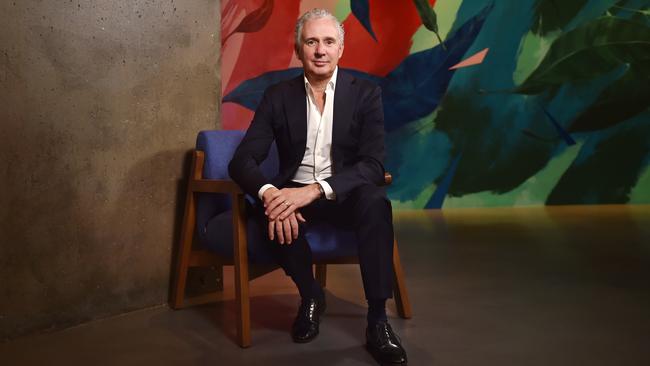From high school dropout to corporate king: Telstra’s Penn honoured
He spent the best part of a decade leading Australia’s largest telecommunications company, but it was a winding road to the top for Andy Penn.

He spent the best part of a decade leading Australia’s largest telecommunications company, but it was a winding road to the top of corporate Australia for Telstra’s former chief executive Andy Penn, who began his career as a high school dropout.
Until his retirement late last year, Mr Penn held two of the highest profile and most important jobs in Australian business, in charge of Telstra where he kept the nation connected through natural disasters, rampant bushfires and the pandemic, and before that as chief executive of insurance giant AXA.
This week awarded an Order of Australia for distinguished service to business, charitable organisations, youth and the arts, the success story of the British-born Mr Penn is a distinctly Australian one.
“I’ve not always made the best choices in life. I dropped out of school, and I didn’t always follow the conventional path,” the executive said in an interview.
“But I’m proud that I’ve been able to get to a point where I’ve led two of Australia’s largest companies, and that shows you that particularly in Australia you can be given a chance and you’re judged by what the contribution that you can make, rather than necessarily where you came from and what school you went to.”
Mr Penn’s first job was at the P&O shipping group in London where was paid less than his daily train ticket. He later moved to Australia with National Mutual, which became AXA, and has over three decades contributed immensely to the nation’s business and arts sectors.
During now what he’s considering a career break, Mr Penn is currently helping orchestrate the federal government’s cyber security strategy, while serving as an advisory board member for The Big Issue and the Juvenile Diabetes Research Foundation. He’s also a trustee of the National Gallery of Victoria and in 2020 received an award from Creativity Australia for an outstanding contribution to the arts, despite being a self-described ‘bad painter’.
“I think creativity is such an important part of our society and brings a richness to society,” he said. “I think a key opportunity for Melbourne post-Covid, there are obviously less people working in the city, and arts and culture can help compensate for that and fill that gap.
“I’ve always felt in business that if you can exercise the left side of your brain as well as your right side, you’ll always come up with better solutions and better answers. That’s not always come naturally to me, I’m a very logical and rational person, but my involvement with the arts has forced me to test the creative side of me and is something that I’ve enjoyed stimulating.”
Across what’s been a varied and demanding career, Mr Penn said he has maintained one key metric for measuring success.
“I’ve always said that in whatever I’m doing I want to feel the weight of my impact, and what I mean by that is I want to be working on something that I think is making a difference.”
Mr Penn became an Australian citizen 25 years ago and said that despite some acute challenges he remains deeply optimistic about the nation’s future. He describes Australia as much more egalitarian than the UK, and singles out Australia’s sporting and arts culture as well as its welcoming and friendly nature as being competitive advantages.
“I think Australia is in an incredibly great position and the future’s bright. There are challenges the globe faces, around societal issues, the income divide, and all sorts of things, but I’ve always been an optimist and I think we have great values as a country. It’s not the country of my origin but it’s my country of choice and it’s certainly where I’m going to choose to spend the rest of my life.”



To join the conversation, please log in. Don't have an account? Register
Join the conversation, you are commenting as Logout